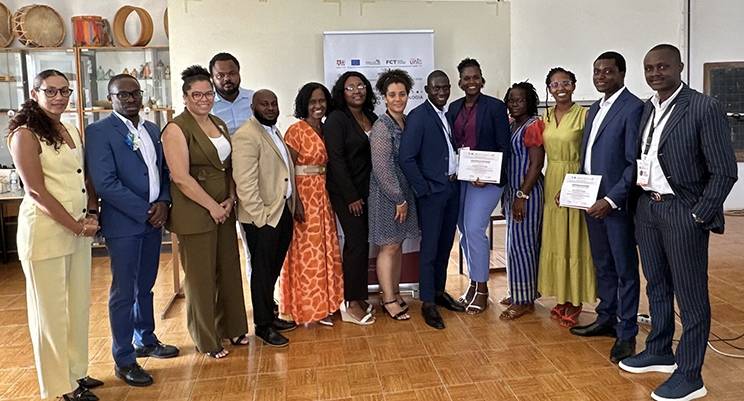FETP-CV closing seminar: a milestone in public health training

The Field Epidemiology Training Programme in Cape Verde (FETP-CV) concluded its first cycle with a six-day seminar held in Mindelo, São Vicente, from 9-14 July 2025. This significant event, themed ‘Scientific Production and Transition to New Challenges’, gathered institutional representatives, faculty members, and 15 Master’s students from Cape Verde, Guinea-Bissau, and São Tomé and Príncipe.
The Master’s degree emerged from a collaborative effort involving five African National Institutes of Public Health, five academic institutions, including the Institute of Hygiene and Tropical Medicine at NOVA University Lisbon, and five research centres. This partnership aims to enhance public health capacities and foster academic exchange among Portuguese-speaking African countries. The FETP-CV project is part of the EDCTP and the Africa CDC initiative to support consortia providing Master’s-level training in epidemiology and biostatistics.
The seminar commenced with a speech by Professor António Pedro Delgado, the project investigator in Cape Verde, who outlined the objectives for the final week. Fellows showcased their Master’s dissertations on topics such as vaccine-preventable diseases and dengue fever epidemiology, highlighting the programme’s practical focus. A session on strategic communication in public health, led by Dr Sofia Rodrigues and Professor Mohsin Sidat, underscored the importance of translating scientific evidence into actionable policy.
The second day adopted an interdisciplinary approach, emphasising the role of social sciences in epidemic response. Group exercises allowed Fellows to engage critically with the socio-behavioural factors influencing health crises. Afternoon sessions provided guidance on scientific publication, equipping students with essential skills for producing impactful research.
Day three featured discussions on the future of field epidemiology training in CPLP countries, addressing challenges faced by small island nations and the role of artificial intelligence in research. This day also saw the defence of dissertations related to HIV/AIDS and epidemiological surveillance, contributing to regional knowledge on public health.
A study visit to Santo Antão on the fourth day allowed participants to observe local health services, reinforcing the connection between academic training and real-world application. This immersive experience was designed to strengthen institutional ties and contextual understanding of field epidemiology.
The fifth day focused on informal networking, culminating in a closing dinner that fostered collaboration among participants. This gathering highlighted the relationships built throughout the programme and the shared commitment to public health improvement.
The seminar concluded with a comprehensive session on scientific writing, aimed at transforming dissertations into publishable articles. This was followed by a certificate award ceremony, marking the Fellows’ transition from trainees to public health professionals. Professor Paulo Ferrinho emphasised the graduates’ role as guardians of knowledge and agents of transformation in their respective countries.
Video messages from experts, including Dr Michael Makanga, Global Health EDCTP3 Executive Director, underscored the programme’s impact on enhancing preparedness for emerging health challenges. Dr Makanga congratulated the students and recognised the essential role of the Master’s degree in strengthening public health responses in the context of emerging diseases and climate crises.
The event concluded with remarks from the Cape Verdean Minister of Health, Dr Jorge Figueiredo, who affirmed the Fellows’ potential to address public health issues with an integrated approach. The FETP-CV closing seminar not only celebrated academic achievements but also laid the foundation for a new generation of public health leaders in Portuguese-speaking Africa.
